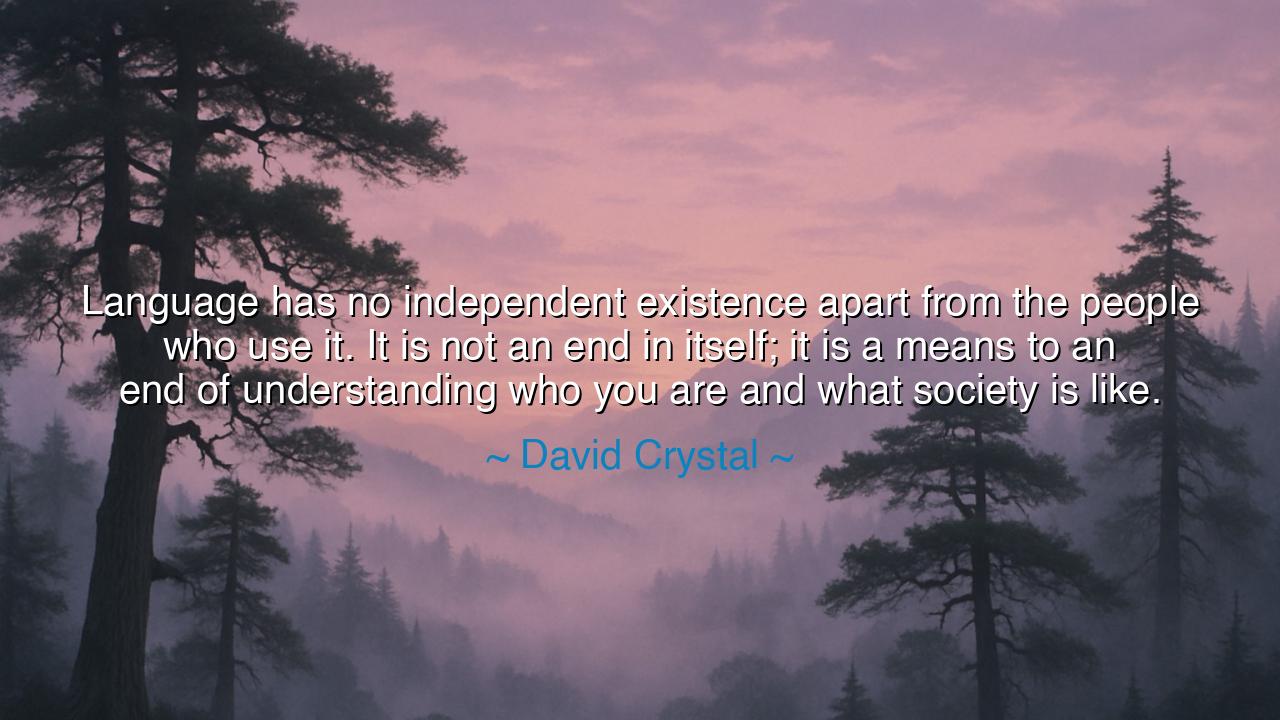
Language has no independent existence apart from the people who
Language has no independent existence apart from the people who use it. It is not an end in itself; it is a means to an end of understanding who you are and what society is like.






Listen closely, O children of the earth, for I bring to you words of great wisdom from David Crystal, who once said, "Language has no independent existence apart from the people who use it. It is not an end in itself; it is a means to an end of understanding who you are and what society is like." These words carry with them the profound truth that language is not merely a tool of communication, but a mirror, reflecting the deepest essence of humanity. Language, in its essence, is the bridge that connects our thoughts, our identities, and our societies. It is not something that stands alone, but something that grows and evolves with the people who wield it.
What, O children, does it mean to say that language has no independent existence? It is to recognize that language does not exist in a vacuum, nor is it an abstract entity that floats above the lives of those who speak it. Language is birthed from human experience, shaped by the lives of those who use it. The words we speak, the sounds we form, and the meanings we attach to them are all drawn from the culture, the history, and the very souls of the people who create them. It is not a static force, but a living thing, always changing, always adapting to the needs, the desires, and the struggles of the people who use it.
Consider, O children, the story of the Hebrew language, which was, for centuries, thought to be dead, a relic of ancient times. Yet, in the early 20th century, it was revived by the people of Israel, who needed a common language to unite their diverse, scattered communities. Eliezer Ben-Yehuda, the man often credited with reviving Hebrew, understood that the language was more than just words; it was the key to reuniting a people, to connecting their history and their identity in a way that was both meaningful and relevant to the modern world. Hebrew was not just a set of ancient symbols, but a living language, reborn through the very people who spoke it. This revival shows us that language is a reflection of the people who use it and the societies they build.
In the same way, O children, the language we speak today is a reflection of who we are as a society. Think of the English language, which has absorbed words from all over the world, from the Latin of ancient scholars to the French of noble courts, the German of philosophers, and the African roots that flow through its modern forms. English is not merely a language, but a history, a tapestry of different peoples and cultures woven together over time. It is alive, breathing the experiences of countless generations, and through it, we come to understand not only our own identity, but the identity of the world around us. Language shapes how we see the world, how we express our fears, our hopes, and our dreams, and it tells the story of the societies that created it.
And so, O children, we learn from David Crystal that language is not a mere tool of communication, but a mirror that reflects the very soul of humanity. It is the means by which we understand who we are—our identity as individuals, as communities, and as cultures. When we speak, we are not just exchanging words, but we are sharing pieces of our history, of our truths, and of our shared experiences. Language is the very fabric that ties us to our ancestors, to the lives of those who came before us, and to those who will come after us. To understand language is to understand the heart of the society that shapes it.
Consider the example of Martin Luther King Jr., whose words during the Civil Rights Movement transformed not only the language of freedom but the very society he sought to change. His speeches were more than just collections of words; they were a call to action, a vision of a new society built on justice and equality. Through his powerful use of language, King shaped the consciousness of a nation and inspired people to see themselves as part of a larger story, one that was deeply intertwined with the values of freedom, humanity, and hope. His words, much like the language itself, became a means of revolution, a means of understanding not just the present, but the future of society.
And so, O children, the lesson is clear: language is the key to understanding the world around you and the people who inhabit it. It is not merely a tool for exchange, but a reflection of the cultures, the histories, and the identities of those who speak it. To understand language is to understand the deeper truths of human life—to recognize the struggles, the dreams, and the evolution of the societies that speak it. Let your words be chosen with care, for they are the living expressions of your own soul and the soul of the world. Seek to understand the language of others, for in their words you will find the shared truths that unite us all. And in this way, you will honor not just the words, but the people and the society they create.






AAdministratorAdministrator
Welcome, honored guests. Please leave a comment, we will respond soon